Did you know that the secret to a healthy gut microbiome could be as simple as adding more vegetables to your diet? It turns out that vegetables not only provide essential nutrients and fiber, but they also play a crucial role in promoting a diverse and balanced community of bacteria in your gut. In this article, we will explore how vegetables contribute to a healthy gut microbiome and how you can incorporate them into your daily meals for optimal gut health. So, get ready to discover the incredible benefits of vegetables and how they can help you achieve a healthier digestive system.
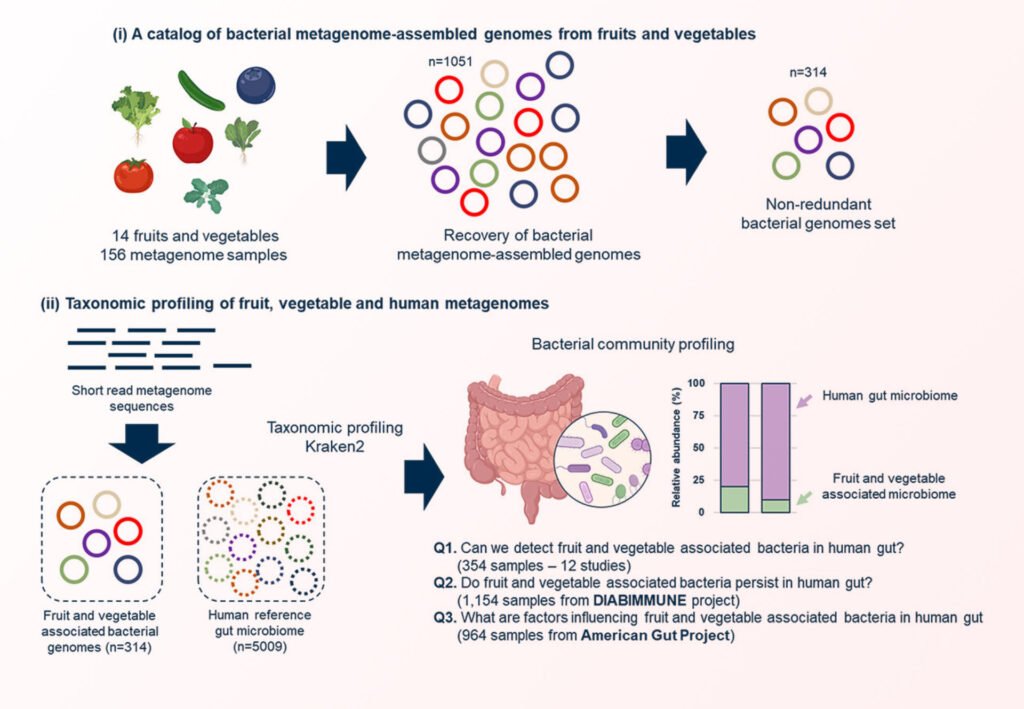
This image is property of cdn.sci.news.
Introduction to Gut Microbiome
Definition of gut microbiome
The gut microbiome refers to the diverse community of microorganisms that reside in your digestive tract. It is made up of trillions of bacteria, viruses, fungi, and other microorganisms. These microorganisms play a crucial role in maintaining your overall health and wellbeing.
Importance of a healthy gut microbiome
Having a healthy gut microbiome is essential for numerous reasons. It is not only involved in digestion and nutrient absorption but also plays a significant role in maintaining a strong immune system, regulating metabolism, and even influencing mental health. A healthy gut microbiome is also linked to a reduced risk of various diseases, including obesity, diabetes, and inflammatory bowel diseases.
Factors that impact gut microbiome
Several factors can influence the composition and health of your gut microbiome. These include diet, lifestyle choices, medication use, stress levels, and even genetics. The food you eat plays a vital role in shaping the community of microorganisms in your gut. And when it comes to a healthy gut microbiome, vegetables are one of the most important food groups.
Role of Vegetables in Promoting a Healthy Gut Microbiome
Fiber Content
One of the key reasons why vegetables are essential for a healthy gut microbiome is their high fiber content. Fiber is a type of carbohydrate that cannot be digested by the human body. Instead, it passes through the digestive system mostly unchanged, reaching the large intestine where it becomes a food source for the beneficial bacteria in your gut.
Prebiotic Properties
In addition to their fiber content, many vegetables also contain prebiotics. Prebiotics are a type of fiber that specifically nourishes and promotes the growth of beneficial bacteria in the gut. They act as fuel for these bacteria, allowing them to thrive and maintain a healthy balance.
Source of Essential Nutrients
Vegetables are not only rich in fiber and prebiotics but also provide essential nutrients that are vital for gut health. They are a great source of vitamins, minerals, and antioxidants, which are all beneficial for maintaining a healthy gut microbiome. These nutrients support the growth of beneficial bacteria and help keep the gut environment balanced and functioning optimally.
Antioxidant Activity
Many vegetables also boast significant antioxidant activity. Antioxidants are compounds that help protect your cells from damage caused by harmful molecules called free radicals. By reducing oxidative stress and inflammation in the gut, antioxidants play an important role in maintaining a healthy gut microbiome.
Fiber Content
Types of fiber in vegetables
There are two main types of fiber found in vegetables: soluble fiber and insoluble fiber. Soluble fiber dissolves in water and forms a gel-like substance in the digestive tract. It helps to soften stools and regulate bowel movements. Insoluble fiber, on the other hand, adds bulk to the stools and aids in maintaining regularity.
Benefits of dietary fiber for the gut
Dietary fiber offers several benefits for the gut. It helps prevent constipation and promotes regular bowel movements by adding bulk to the stools. Fiber also acts as a prebiotic, providing nourishment to the beneficial bacteria in the gut and supporting their growth and activity. Additionally, fiber helps to maintain a healthy gut environment by regulating pH levels and preventing the overgrowth of harmful bacteria.
Effect of fiber on gut bacteria
The consumption of fiber-rich vegetables has a profound impact on the composition of your gut bacteria. The beneficial bacteria in your gut feed on the fiber, fermenting it and producing short-chain fatty acids (SCFAs) as a byproduct. SCFAs have numerous health benefits, including reducing inflammation, improving gut barrier function, and regulating appetite.
Recommended daily fiber intake
To maintain a healthy gut microbiome, it is recommended to consume an adequate amount of dietary fiber daily. The general guideline for adults is to aim for at least 25-30 grams of fiber per day. However, it is important to note that everyone’s fiber needs may vary based on factors such as age, sex, and activity level.
Prebiotic Properties
Definition of prebiotics
Prebiotics are a type of fiber that cannot be digested by the human body. Instead, they pass through the digestive system intact and reach the large intestine, where they selectively feed and stimulate the growth of beneficial gut bacteria.
How prebiotics promote gut health
Prebiotics play a crucial role in promoting gut health by supporting the growth of beneficial bacteria in the gut. These beneficial bacteria help maintain a healthy gut environment, compete with harmful bacteria, enhance nutrient absorption, and support immune health. By nourishing and stimulating the growth of these beneficial bacteria, prebiotics contribute to a balanced and diverse gut microbiome.
Vegetables rich in prebiotic fibers
Several vegetables are excellent sources of prebiotic fibers. Some examples include garlic, onions, leeks, asparagus, artichokes, and chicory root. By incorporating these vegetables into your diet, you can increase your intake of prebiotics and support the growth of beneficial gut bacteria.
Effect on gut bacteria composition
Consuming prebiotic-rich vegetables can have a positive impact on the composition of your gut bacteria. These vegetables provide the essential food sources that beneficial bacteria need to thrive and multiply. By promoting the growth of these beneficial bacteria, prebiotic-rich vegetables contribute to a diverse gut microbiome and help maintain a healthy balance of microorganisms.
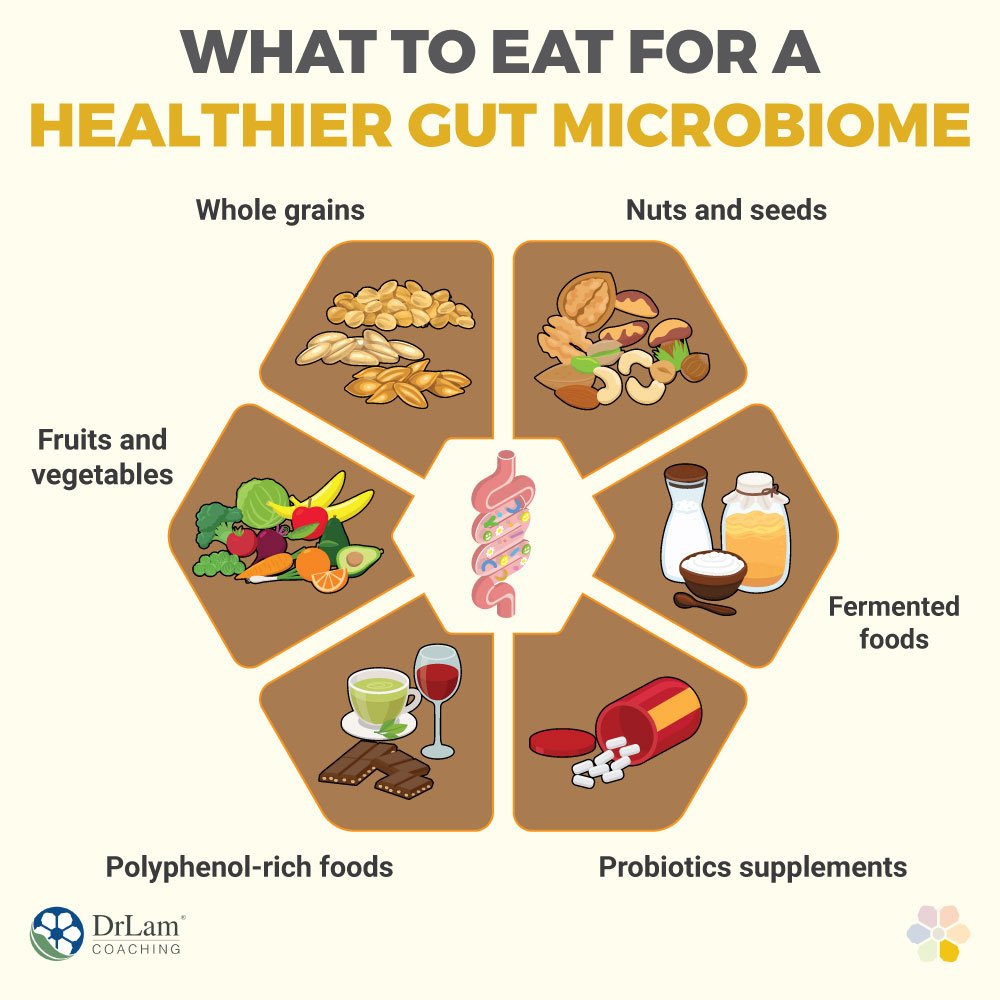
This image is property of www.drlamcoaching.com.
Source of Essential Nutrients
Vitamins and minerals in vegetables
Vegetables are packed with essential vitamins and minerals that are vital for gut health. They are rich in vitamins A, C, E, and K, as well as various B vitamins. These vitamins play important roles in maintaining the health and integrity of the gut lining, supporting immune function, and promoting overall gut health. Vegetables are also excellent sources of minerals such as potassium, magnesium, and zinc, which are necessary for various physiological processes in the gut.
Importance of these nutrients for gut health
The vitamins and minerals found in vegetables are essential for maintaining a healthy gut microbiome. They provide the necessary nutrients for the growth and activity of beneficial gut bacteria, support the gut’s immune defenses, and help maintain the integrity of the gut lining. Without an adequate intake of these nutrients, the gut microbiome may suffer, leading to imbalances and potential health issues.
Roles of specific nutrients in gut microbiome
Specific nutrients found in vegetables have been shown to have direct effects on the gut microbiome. For example, vitamin A has been shown to enhance the growth of beneficial bacteria and regulate the immune response in the gut. Vitamin C has antioxidant properties that can reduce inflammation in the gut, while zinc supports the maintenance of gut barrier function and promotes healthy immune responses.
Antioxidant Activity
Antioxidants in vegetables
Vegetables are well-known for their antioxidant properties. Antioxidants are compounds that help protect cells from damage caused by free radicals, which are unstable molecules that can cause oxidative stress and contribute to various diseases. Common antioxidants found in vegetables include vitamin C, vitamin E, beta-carotene, and various phytochemicals.
Effects of antioxidants on gut health
The antioxidants found in vegetables play a crucial role in maintaining a healthy gut microbiome. They help reduce oxidative stress and inflammation in the gut, which can contribute to the development of digestive disorders and other health issues. By neutralizing free radicals and reducing inflammation, antioxidants support a healthy gut environment and promote the growth of beneficial bacteria.
Reduction of inflammation in the gut
Inflammation in the gut can disrupt the balance of the gut microbiome and lead to various gastrointestinal disorders. The antioxidants found in vegetables help reduce inflammation in the gut by neutralizing free radicals and inhibiting inflammatory processes. By reducing inflammation, vegetables contribute to a healthy gut microbiome and support overall gut health.
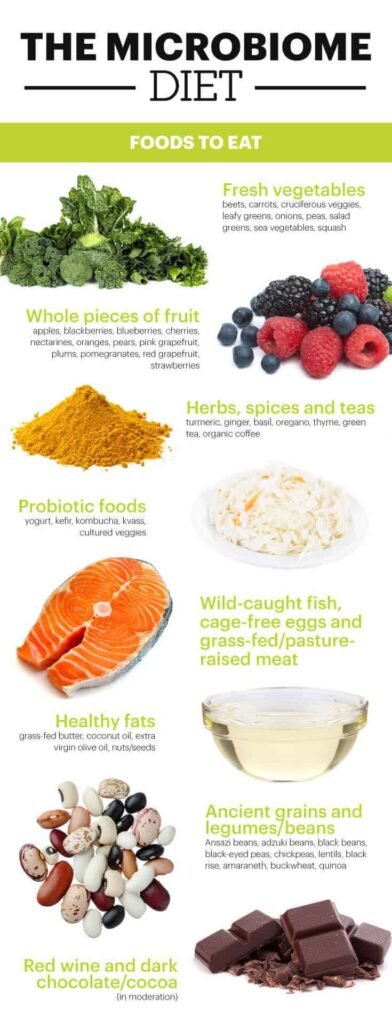
This image is property of draxe.com.
Impact of Different Vegetable Groups on Gut Microbiome
Cruciferous vegetables
Cruciferous vegetables, such as broccoli, cauliflower, and Brussels sprouts, are rich in fiber, prebiotics, and antioxidants. They have been shown to promote the growth of beneficial gut bacteria and contribute to a diverse gut microbiome. Cruciferous vegetables also contain compounds known as glucosinolates, which can be metabolized by gut bacteria into substances that have anti-cancer properties.
Leafy greens
Leafy greens, such as spinach, kale, and Swiss chard, are packed with fiber, vitamins, minerals, and antioxidants. They provide nourishment to beneficial gut bacteria and help maintain a healthy gut environment. Leafy greens also contain high levels of chlorophyll, a compound that has been shown to have antimicrobial properties and can support a balanced gut microbiome.
Root vegetables
Root vegetables, such as carrots, sweet potatoes, and beets, are excellent sources of fiber, vitamins, and minerals. They contribute to a healthy gut microbiome by providing essential nutrients to beneficial gut bacteria. Root vegetables also contain compounds called polyphenols, which have antioxidant and anti-inflammatory properties that support gut health.
Allium vegetables
Allium vegetables, including garlic, onions, and leeks, are known for their distinctive flavor and their high content of prebiotic fibers. These prebiotics feed beneficial gut bacteria and promote a diverse and balanced gut microbiome. Allium vegetables also contain sulfur compounds, which have been shown to have antimicrobial and anti-inflammatory effects in the gut.
Nightshade vegetables
Nightshade vegetables, such as tomatoes, peppers, and eggplants, have been shown to have beneficial effects on the gut microbiome. They are rich in fiber, vitamins, and antioxidants, which support the growth of beneficial bacteria and contribute to a healthy gut environment. Nightshade vegetables also contain compounds called alkaloids, which can have anti-inflammatory and immune-modulating effects in the gut.
Benefits of diverse vegetable consumption
Consuming a diverse range of vegetables is key to promoting a healthy gut microbiome. Different vegetables provide various types of fibers, prebiotics, vitamins, minerals, and antioxidants, each contributing to the overall health and diversity of the gut microbiome. By incorporating a variety of vegetables in your diet, you can optimize the benefits for your gut and support optimal gut health.
Cooking Methods and Gut Microbiome
Effect of cooking on vegetable fiber
The cooking process can affect the fiber content of vegetables. Insoluble fiber, which adds bulk to stools, is generally resistant to the cooking process and remains largely intact. However, soluble fiber, which forms a gel-like substance, can be partially broken down during cooking. While cooking can lead to some loss of soluble fiber, it can also make vegetables easier to digest and increase the availability of certain nutrients.
Raw vs. cooked vegetable impact on gut
Both raw and cooked vegetables can have positive effects on the gut microbiome. Raw vegetables often retain a higher level of heat-sensitive nutrients, such as vitamin C and certain enzymes. On the other hand, cooking can enhance the availability of other nutrients and make vegetables easier to digest. The key is to incorporate a combination of raw and cooked vegetables into your diet to maximize the benefits for your gut microbiome.
Fermented vegetables and gut health
Fermented vegetables, such as sauerkraut, kimchi, and pickles, have gained popularity for their potential benefits for gut health. Fermentation is a process that involves the breakdown of sugars by beneficial bacteria, resulting in the production of lactic acid and other beneficial compounds. Eating fermented vegetables can introduce beneficial bacteria into your gut and support a healthy gut microbiome.
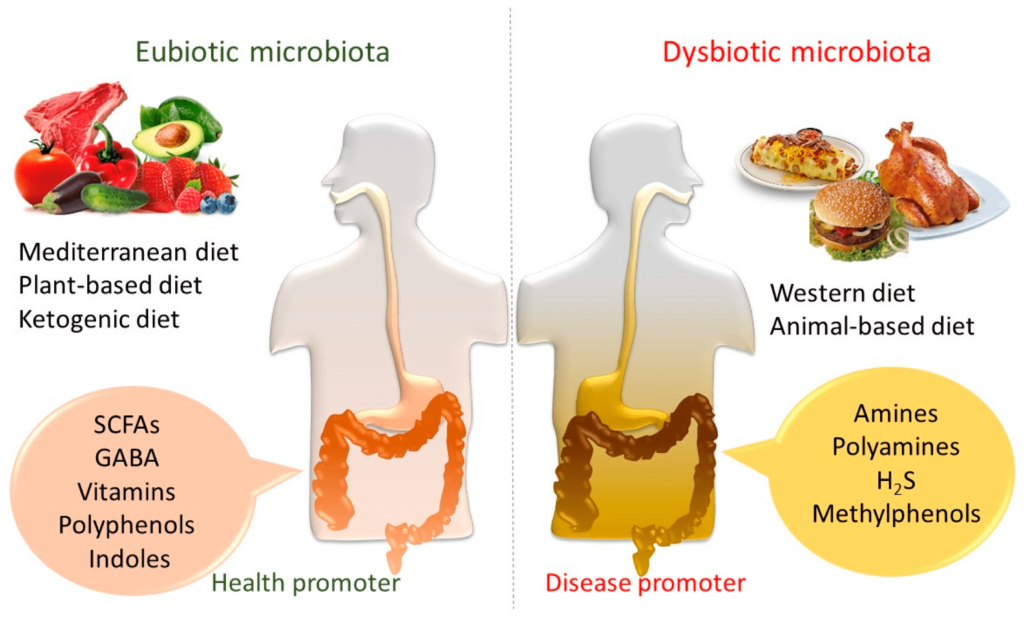
This image is property of www.mdpi.com.
Dietary Recommendations for a Healthy Gut Microbiome
Incorporating a variety of vegetables in the diet
To promote a healthy gut microbiome, it is important to incorporate a variety of vegetables into your diet. Different vegetables offer unique benefits for your gut, so aim to incorporate a mix of cruciferous vegetables, leafy greens, root vegetables, allium vegetables, and nightshade vegetables. By diversifying your vegetable intake, you can ensure a wide range of nutrients and promote a diverse gut microbiome.
Balancing vegetable consumption with other food groups
While vegetables are essential for a healthy gut microbiome, it is important to maintain a balanced and varied diet that includes other food groups as well. Protein sources, whole grains, healthy fats, and fruits all play important roles in supporting overall health and providing essential nutrients for the gut. Strive for a well-rounded diet that includes a variety of whole foods to optimize your gut microbiome.
Tips for maximizing vegetable benefits for the gut
To maximize the benefits of vegetables for your gut, consider the following tips:
- Choose a variety of colorful vegetables to ensure a wide range of nutrients.
- Include both raw and cooked vegetables in your diet.
- Try incorporating fermented vegetables for additional probiotic benefits.
- Experiment with different cooking methods, such as steaming, roasting, or sautéing.
- Consider incorporating vegetable smoothies or juices into your routine for added nutrient density.
By following these tips, you can make the most of your vegetable intake and support a healthy gut microbiome.
Conclusion
In conclusion, vegetables play a significant role in promoting a healthy gut microbiome. Their high fiber content, prebiotic properties, essential nutrients, and antioxidant activity all contribute to a balanced and diverse gut microbiome. By incorporating a variety of vegetables into your diet and considering different cooking methods, you can optimize the benefits for your gut health. Remember to strive for a well-rounded diet that includes a range of whole foods and aim for daily fiber recommendations to support optimal gut microbiome health.
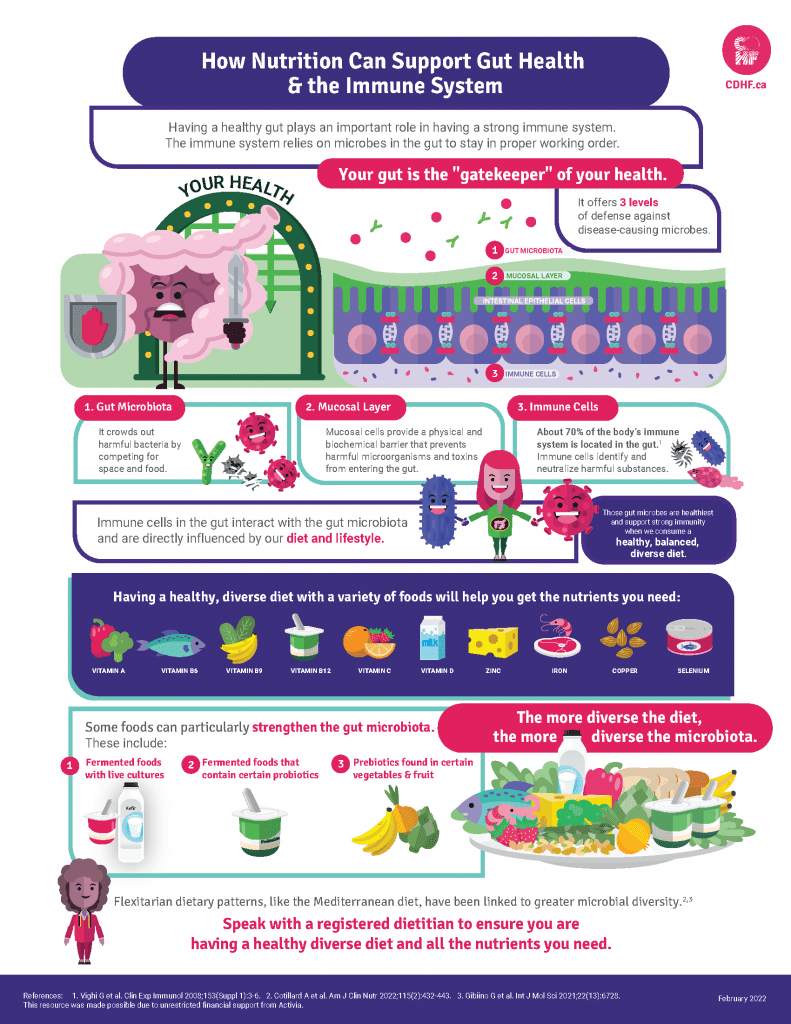
This image is property of cdhf.ca.
